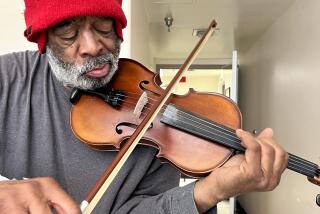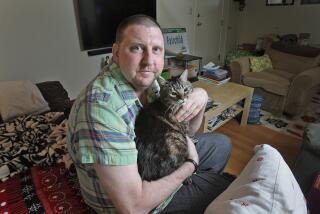Clinic, Family at Odds Over Fatherâs Care : Insurance: Center denies survivorsâ charge that doctors showed more concern for costs than for dying manâs well-being.
Phillip Negrete, a 67-year-old retired Army sergeant, thought he had bought peace of mind when he signed over his Medicare insurance to a private health-care group last September.
But when cancers began to eat away at his liver and his bones, his family says he found out differently.
Three days before he died in July, Negreteâs doctor ignored his familyâs pleas to let him stay in the hospital, and sent him back to his Oxnard home in an ambulance.
There, his family says, he was left in pain, without a nurse, to slowly drown in phlegm that was forming in his lungs and which he did not have the strength to cough up.
âMy father didnât want any heroic measures to save his life,â daughter Lucia Shaw of Ventura said. âHe just wanted to die comfortably. But he was not comfortable.â
Barbara Montano, a registered nurse who intervened and helped get Negrete into a nursing home before he died, said: âYou give better care to dying animals than they gave this man.â
Shaw and Montano are convinced that Negrete was mistreated because his health insurance was managed by a doctor-owned clinic where partners receive bonuses if they spend less on patients than they receive in premiums each year.
Administrators at the Buenaventura Medical Clinic, which oversaw Negreteâs care, angrily reject the charge. Clinic doctors are paid a flat base salary--an average of $130,000 for family physicians--and potential bonuses rarely materialize, they said.
Patient care is based solely on need, not profits, though doctors are careful to avoid unnecessary costs, said Dr. Margaret Bischel, clinic medical director.
In Negreteâs case, appropriate care was provided, she said.
Negreteâs physician, Dr. Catherine Sanders, discharged him from St. Johnâs Regional Medical Center because she saw no sign that hospital care was still necessary, Bischel said.
âIf she had dreamed the patient would be back in the hospital within 24 hours she never would have discharged him,â Bischel said. âHe was not short of breath. She asked him if his pain medication was sufficient, and he assured her it was.â
Enfeebled, the terminally ill man may have needed nursing-home care. But that offer was rejected by his wife when he was discharged, Bischel said, a claim that widow Eiko Negrete refutes.
And, in Negreteâs case, the clinic can hardly be accused of skimping on care, Bischel said. Together, the clinic and an associated health plan spent about $30,000 on him. The government paid them $3,685 for the care.
âIâm a little angry that this family is dealing with their grief by directing a lot of anger and denial at the clinic,â Bischel said. âI think you should be talking to the other 59,999 patients that love us and appreciate us and understand all that we do for them.â
The Negrete case--whether horror story, regrettable misunderstanding or angry vendetta--illustrates how health plans and their physician groups may deal with patients in the expanding world of managed health care.
About one half of all Ventura County residents are covered by managed-care plans that generally require patients to use a specific network of doctors and hospitals to receive full coverage.
Membership in health maintenance organizations, the most common type of managed-care group, has doubled nationwide to 37 million since 1985. And analysts say that all types of managed-care--rather than traditional health insurance policies--could predominate by the year 2000 because it is more efficient and less costly.
The case of Phillip Negrete demonstrates both the allure of such plans and, in his familyâs view, their shortcomings.
Beckoned by advertisements, Negrete transferred his Medicare health coverage to the Secure Horizons plan 15 months ago.
âIt just sounded so good on TV,â said daughter Shaw. âNo bill and no worries at all. Life is supposed to be wonderful after that.â
Secure Horizons, part of PacifiCare, the fourth largest HMO in California, sent Negrete to the Buenaventura clinic for his primary care.
Buenaventura, the countyâs largest physicians group with 60 doctors, has an office in Oxnard. So Negrete picked a doctor close to his home.
Negrete was enrolled with Secure Horizons under that HMOâs ârisk contractâ with Medicare. For Negrete, Secure Horizons received $335 a month--95% of the patientâs Medicare benefit--and it paid Buenaventura 38% of that, Bischel said.
In return, they agreed to provide all his medical care.
Negrete had trouble with Buenaventura almost from the start, his wife and daughter said.
Soon after he changed his insurance, Negrete began a series of visits to his new doctor, complaining of back pain. But the doctor prescribed only muscle relaxers and pain pills, Shaw said.
âMy father kept telling the doctor that he had a lump in his (torso) and that he had a history of cancer,â she said. âThe doctor said it was probably a stool in his colon.â
Shortly after his last appointment, Negrete was admitted to St. Johnâs in excruciating pain because of bowel blockage Shaw believes was caused by the muscle relaxers. A diagnostic scan in late October found he also had cancer of the liver and bone.
Sanders, who took over Negreteâs case at that point, has declined to comment on the patientâs care.
But medical director Bischel said Negreteâs early treatment by another physician represents the norm for patients with back pain, since the ailment often goes away without special treatment.
âEven in a cancer patient, most back pain is not due to cancer,â she said. âI donât see how the patient was harmed by conservative treatment for a month. And when it was no longer working, he had an all-out investigation (for cancer).â
For the next eight months, under the care of a cancer specialist on contract with the clinic, the family said Negreteâs treatment was generally good.
Negrete received chemotherapy. And records show that his cancer was analyzed with at least four sets of expensive diagnostic tests costing $600 to $800 each, Bischel said.
Finally, after a 13-day hospital stay in June, Negrete decided that his condition was terminal and that he wanted no more life-extending treatment.
Buenaventura offered hospice care, where a nurse would visit daily to help change linen and see if Negrete needed any special treatment--such as injections for pain or the suction of fluid from his lungs.
But Negrete had seen another cancer patient die peacefully in his sleep while hooked to an intravenous morphine drip. And he decided that was the way he wanted to die, his family said.
Since they were told the hospice does not provide intravenous medication or nourishment, the Negretes said, they declined the offer.
That apparently was a misunderstanding, since a representative from the Livingston Memorial hospice program in Ventura, which sometimes works with the Buenaventura clinic, said that hospice care can include intravenous pain control.
Sandersâ recollection, however, was that Negrete âwas a lovely person who would have gladly accepted hospice and all the care that went with it, but the family wouldnât let him,â Bischel said.
A week later, on July 4, Negrete was readmitted to St. Johnâs as an emergency patient, unable to breathe because of congestion in his lungs. Sanders returned from a holiday to find him still there three days later.
âShe wanted to know why he was there. She was kind of nasty,â recalled Eiko Negrete, 59, a reserved native of Japan who married her military husband in 1953. âI had the feeling she was upset because we didnât take her advice to use that hospice care.â
Bischel said Sanders offered to arrange for Negreteâs care in a nursing facility.
âDr. Sanders recalls that the family was very unhappy that the patient was being discharged to (home) or to a nursing home,â Bischel said. âThey wanted him to die in a hospital.â
But Eiko Negrete said Sanders never offered her husband a transfer to a nursing home.
âShe said, âIf you have $14 million, you can put him in a skilled nursing facility,â â Negrete said. âShe talked to me like that in front of my husband. I was very upset about that.â
Unable to help himself, Negrete was taken home by ambulance and left in his bed. By the next morning his lungs had begun to fill again, his wife said.
Eiko Negrete said she called a home-nursing service associated with Buenaventura to see what time they planned to visit that day, but was told no nurse had been ordered.
By noon, âmy husband was terrified. He was not able to breathe,â she said. Three calls to Buenaventura over a two-hour period finally ended in the clinic authorizing Negrete to call an ambulance, she said.
But after emergency-room attendants had relieved Negreteâs congestion, Sanders and the family argued again about whether the patient should be readmitted.
âThis was an absolute fight,â recalled nurse Montano, the family friend who spent the afternoon with the Negretes. âFinally, (the doctor) said, âI didnât know he was really feeling like this.â â
Clinic records note that Sanders was having a âdifficult timeâ with the family. But once the clinic found a bed for him in a Ventura nursing home, the family was satisfied.
From his bedside the next evening, Montano watched as Negrete slipped into a morphine sleep and died. âHe patted my hand and said, âThis is what I want.â He did not want to be a burden.â
The Negretesâ story is heart-wrenching, Bischel said, but does not jibe with the facts as she knows them.
Nor did the family file a complaint with Secure Horizons or the clinic, the medical director said. If dissatisfied, Negrete could have canceled his insurance and gone back to Medicare within 30 days, she said.
Buenaventura did not grow from 22 doctors to 60 in seven years by mistreating patients, she said. And cost was never a factor in the Negrete case, she said.
âThe most cost-efficient approach to care is to do it right,â Bischel said.
âPatients do have a desire to direct their own care as though all medical care were free,â she said. âBut I donât believe that was an issue in Mr. Negreteâs care.â
More to Read
Sign up for Essential California
The most important California stories and recommendations in your inbox every morning.
You may occasionally receive promotional content from the Los Angeles Times.










